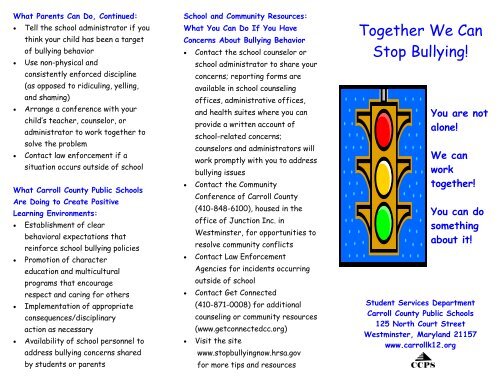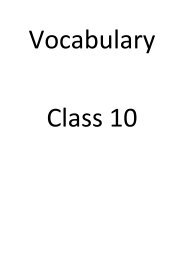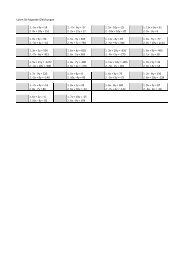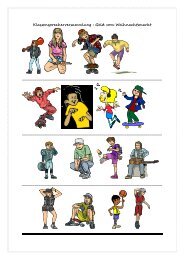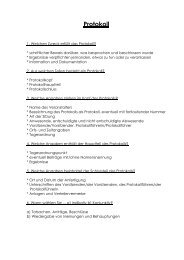BullyingBrochure
Create successful ePaper yourself
Turn your PDF publications into a flip-book with our unique Google optimized e-Paper software.
What Parents Can Do, Continued:<br />
• Tell the school administrator if you<br />
think your child has been a target<br />
of bullying behavior<br />
• Use non-physical and<br />
consistently enforced discipline<br />
(as opposed to ridiculing, yelling,<br />
and shaming)<br />
• Arrange a conference with your<br />
child’s teacher, counselor, or<br />
administrator to work together to<br />
solve the problem<br />
• Contact law enforcement if a<br />
situation occurs outside of school<br />
What Carroll County Public Schools<br />
Are Doing to Create Positive<br />
Learning Environments:<br />
• Establishment of clear<br />
behavioral expectations that<br />
reinforce school bullying policies<br />
• Promotion of character<br />
education and multicultural<br />
programs that encourage<br />
respect and caring for others<br />
• Implementation of appropriate<br />
consequences/disciplinary<br />
action as necessary<br />
• Availability of school personnel to<br />
address bullying concerns shared<br />
by students or parents<br />
School and Community Resources:<br />
What You Can Do If You Have<br />
Concerns About Bullying Behavior<br />
• Contact the school counselor or<br />
school administrator to share your<br />
concerns; reporting forms are<br />
available in school counseling<br />
offices, administrative offices,<br />
and health suites where you can<br />
provide a written account of<br />
school-related concerns;<br />
counselors and administrators will<br />
work promptly with you to address<br />
bullying issues<br />
• Contact the Community<br />
Conference of Carroll County<br />
(410-848-6100), housed in the<br />
office of Junction Inc. in<br />
Westminster, for opportunities to<br />
resolve community conflicts<br />
• Contact Law Enforcement<br />
Agencies for incidents occurring<br />
outside of school<br />
• Contact Get Connected<br />
(410-871-0008) for additional<br />
counseling or community resources<br />
(www.getconnectedcc.org)<br />
• Visit the site<br />
www.stopbullyingnow.hrsa.gov<br />
for more tips and resources<br />
Together We Can<br />
Stop Bullying!<br />
CCPS<br />
You are not<br />
alone!<br />
We can<br />
work<br />
together!<br />
You can do<br />
something<br />
about it!<br />
Student Services Department<br />
Carroll County Public Schools<br />
125 North Court Street<br />
Westminster, Maryland 21157<br />
www.carrollk12.org
Together We Can Stop Bullying<br />
Background:<br />
The Board of Education of Carroll<br />
County is committed to establishing and<br />
promoting a safe, non-threatening<br />
environment for all students to learn.<br />
Therefore, the Board will not tolerate<br />
any acts of bullying, harassment,<br />
intimidation, discrimination, or hazing on<br />
the part of students or employees.<br />
Definitions:<br />
Bullying, harassment, or intimidation<br />
means intentional conduct, including<br />
verbal, physical, or written conduct or an<br />
intentional electronic communication<br />
that creates a hostile environment and<br />
which interferes with a student’s<br />
physical or psychological well-being.<br />
Examples of Bullying Behaviors :<br />
• Physical violence or attacks<br />
• Spreading rumors<br />
• Name-calling, put-downs, ridiculing<br />
• Threats and intimidation<br />
• Extortion or theft<br />
• Deliberate exclusion from a peer<br />
group<br />
Warning Signs of Bullying:<br />
• Reluctance to attend school<br />
activities<br />
• Unexplainable drop in academic<br />
performance<br />
• Avoidance of the school<br />
cafeteria or playground<br />
• Reluctance to walk to or from<br />
school<br />
• Reluctance to talk about what’s<br />
happening at school<br />
• Torn clothing<br />
• Headaches, stomachaches, or other<br />
unexplainable illnesses<br />
• Changes in sleep patterns<br />
• Sad or depressed demeanor and/or<br />
unexplained anger outbursts<br />
• Loss of interest in activities<br />
formerly enjoyed<br />
Harmful Effects of Bullying:<br />
• School avoidance, truancy<br />
• Lowered grades, reduced learning<br />
• Lowered self-esteem and lowered<br />
self-confidence<br />
• Physical illness<br />
• Anxiety, depression<br />
What Students Can Do:<br />
• Remain calm and stay in control of<br />
your emotions; avoid physical<br />
contact if possible<br />
• Act confidently—stand up tall,<br />
speak in a friendly, firm voice<br />
• Use specific “I-messages” such as<br />
“I don’t like it when you____, and<br />
I want you to stop.”<br />
• Find allies/buddies who can<br />
provide support<br />
• Seek the help of an adult and<br />
report bullying behaviors<br />
• Speak up on behalf of others<br />
being targeted<br />
• Refrain from participating in the<br />
laughing at or teasing of others<br />
• Show respect for all people<br />
regardless of their differences<br />
What Parents Can Do:<br />
• Listen to your child and<br />
encourage discussions about<br />
the school day<br />
• Take complaints of intimidation<br />
seriously<br />
• Watch for symptoms such as<br />
social withdrawal, drop in<br />
grades, and school avoidance<br />
Continued on back


